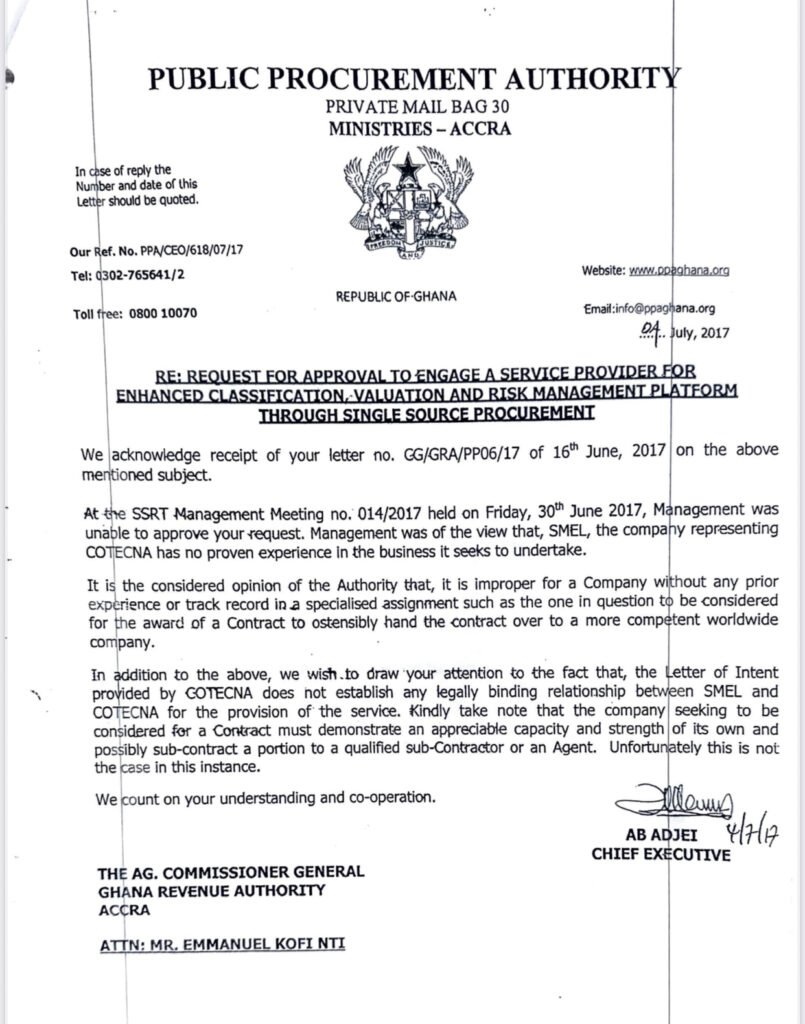Investigative journalist Manasseh Azure Awuni has released a Public Procurement Authority (PPA) letter denying a request from the Ghana Revenue Authority (GRA) to engage Strategic Mobilisation Ghana Limited (SML) through single-source procurement, citing lack of experience and capacity.
In a publication on his X page, Manasseh detailed that the PPA explicitly refused to approve the procurement deal between GRA and SML for its Enhanced Classification, Valuation and Risk Management Platform, labeling the move as “improper” due to SML’s lack of proven competence in the specified area.

Manasseh Azure, whose previous investigations into the SML deal triggered national discourse, stated that contrary to claims by SML that it earns payment based on revenue recoveries for the state, the company actually receives a fixed percentage of revenue from every litre of petroleum product sold in Ghana, every barrel of oil produced and every ounce of gold mined in Ghana
He argued that SML has not made any actual recoveries, and that its alleged shady engagement with the state was exposed by The Fourth Estate, the media platform under which the initial investigative documentary was released.
The developments come on the back of a coordinated raid on the offices of SML by the Office of the Special Prosecutor (OSP) in collaboration with National Security operatives. The action, confirmed by 3Business, forms part of ongoing investigations into a controversial $500 million contract involving the company.
Manasseh revealed that SML made false claims about its impact, including assertions that it had saved Ghana GHS3 billion. This claim was previously touted on the company’s website and made headlines—including a front-page feature in the state-owned Daily Graphic.
However, when confronted by Manasseh and his team, SML’s Managing Director, Christian Tetteh Sottie, admitted the information was false and blamed the media for the error. When reminded that the claim appeared on the company’s own website, Sottie responded, “I don’t know about any website matter.”
Shortly after the interview, the false claims disappeared from SML’s website.
“First, the company had claimed that it saved the nation GHS3 billion as a result of its operations. The story had been widely published by the Ghanaian newspaper and made it to the front page of the state-owned Daily Graphic.The investigation proved that this was false. When confronted, the Managing Director of the Company, Christian Tetteh Sottie, admitted the information was false. He claimed the media got it wrong.” He stated
According to pages 157–158 of a KPMG audit report commissioned by former President Nana Akufo-Addo after the Fourth Estate’s exposé, SML played no role in increasing revenue or volumes in Ghana’s downstream petroleum sector. The report states that SML recorded the lowest volumes during the period under review.
Further falsehoods were noted on SML’s website, where the company claimed it had stemmed under-reporting, diversion, and dilution in the petroleum sector. But when the journalists presented evidence, the GRA itself confirmed that these services were already being handled by other state contractors, and not by SML.
SML’s own Managing Director also admitted, “We are not involved in diversion. We are only at the depots. If the thing [fuel] is lifted, we don’t know ”
Another SML official, Serwaa Yaa Sarpong, attempted to explain the misleading claims on Newsfile, saying the website was “only an advertisement” of potential services. However, SML had earlier admitted it had no contracts outside its government dealings, making the explanation factually weak.
Manasseh questioned the very basis for engaging SML, stating that if the company does not track irregularities or enhance compliance, then “it is difficult to say which problem SML was brought in to resolve.”
He further highlighted that, since 2020, SML has not flagged a single anomaly in its operations—something even the company’s MD admitted on camera.
“The Managing Director of SML, Christian Tetteh Sottie, admitted on camera that since the company started operations in 2020, it had not flagged even a single anomaly. He further stated that SML was not into checking irregularities or noncompliance. That, he said, was the work of the GRA.So, if a company does not check irregularities and non-compliance, how could its work affect shady players in the industry? Nobody has been able to say how.” He stated
Despite this, some academics from the University of Ghana and UPSA have defended SML’s role, often accusing critics of representing interests harmed by the company’s work. But Manasseh counters, “If the company doesn’t detect irregularities or flag non-compliance, whose interests does it threaten?”


